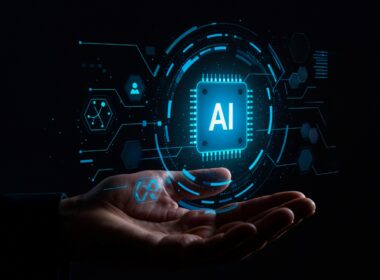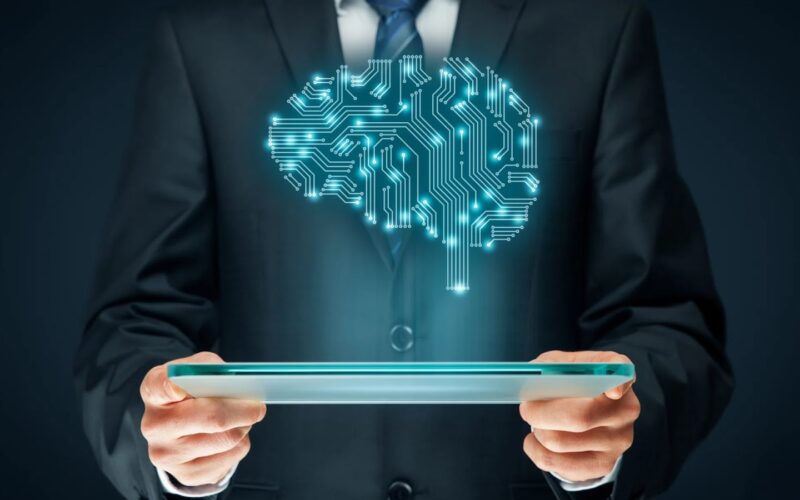The pressure to innovate is constant, but for established enterprises, so is the risk of disruption. Many business leaders see AI as a crucial piece of that puzzle, yet the real-world value remains shrouded in generic promises.
A recent study by Gartner projects that by 2028, 33% of enterprise software will feature agentic AI, enabling 15% of daily work decisions to be made autonomously. So, how could you use this shift to not only reduce operational burdens but also to strengthen your market position?
This blog explores 10 key applications of artificial intelligence across diverse industries. We’ll examine the core challenges you face and illustrate how AI is a crucial asset for achieving tangible results.
Key Takeaways
- AI is a strategic imperative for businesses, moving beyond a buzzword to solve complex, enterprise-level challenges.
- The evolution of AI from simple automation to advanced, autonomous systems is creating a new paradigm of generative and agentic AI.
- AI is transforming key industries like healthcare, finance, education, and logistics by delivering specific, outcome-based solutions.
- Successful AI adoption requires a strategic partnership to bridge the gap between initial vision and a profitable reality.
Understanding the Role of AI for Enterprises
Artificial intelligence has evolved from a technical curiosity into a strategic imperative. Its value lies in its ability to solve complex, real-world problems by processing information and making decisions at a scale and speed that were previously impossible.
For a business, this translates into a powerful capability to manage vast datasets, optimize intricate operations, and proactively mitigate risk. So, the question is no longer “should we use AI?” but “how do we deploy AI to drive tangible business outcomes?”
The New AI Paradigm
Artificial intelligence is about enabling machines to perceive, reason, and act in ways that were once exclusive to human intelligence. While earlier forms of AI were primarily reactive, modern developments have ushered in a new era of autonomous systems.
Two key advancements are reshaping how businesses operate:
- Generative AI: This technology is designed to create new content from a set of parameters. From developing marketing copy and design concepts to software code and product documentation, it accelerates creativity and human productivity.
- Agentic AI: This is the next phase of AI evolution. An AI agent is a system that can reason, plan, and execute a series of steps to achieve a specific goal without constant human intervention. It moves beyond simply creating content, enabling end-to-end process automation and dynamic problem-solving.
These advancements are not just theoretical concepts. They are the foundational technologies that power the next generation of business solutions, delivering measurable results across every major industry.
10 Best AI Applications Across Industries
The value of AI is no longer a conversation about its potential but its proven impact. AI algorithms are becoming increasingly sophisticated, not just in their ability to process data but in their capacity to reason, learn, and adapt. This evolution has unlocked a new generation of applications that provide a direct competitive advantage.
A recent IBM study found that 42% of enterprise-scale companies with over 1,000 employees are actively using AI, with a strong focus on areas like IT, security, and risk management. This data confirms AI is a critical tool for maintaining operational integrity and managing reputational risk.
Let’s explore how these advanced AI capabilities are being deployed to solve critical challenges and drive measurable outcomes across industries.
1. Healthcare
The healthcare industry is burdened by rising costs, fragmented data, and administrative inefficiencies that hinder the quality and speed of care. AI offers a powerful solution by making healthcare systems more intelligent and proactive.
- Predictive Analytics for Preventive Care: AI algorithms can analyze a patient’s entire medical history, lab results, and genomic data to identify patterns that may signal the risk of a specific disease, such as a heart condition or diabetes, years in advance. This allows for preventive interventions, reducing the high costs and human toll of emergency care.
- Agentic AI for Administrative Automation: Paperwork and administrative responsibilities are a major time commitment for healthcare professionals. Agentic AI can automate complex, multi-step workflows, from patient scheduling and insurance pre-authorization to billing and follow-ups. This frees up staff to focus on direct patient care, combating burnout and improving overall service quality.
- Enhanced Diagnostics: AI-powered systems can analyze medical images, like CT scans and MRIs, with a level of precision that can surpass human capabilities. These systems can detect tiny, hard-to-spot anomalies that may indicate conditions like early-stage cancer or neurological disorders, enabling faster and more accurate diagnoses.
Impact: This shift significantly improves patient outcomes and operational efficiency. By predicting conditions and automating routine tasks, AI not only saves costs but, more importantly, enhances the quality of care, reinforces patient trust, and strengthens the institution’s reputation.
Is your healthcare organization struggling to turn vast amounts of patient data into clear, actionable insights?
Codewave’s Healthcare Data Analytics service transforms this fragmented information into a powerful system that provides a 360-degree view of patient health and operations. We use predictive intelligence and AI/ML to give you the insights needed to improve patient care and boost operational efficiency.
Book a consultation to turn your data into a powerful asset.
2. Fintech
The financial services sector consistently faces challenges in combating fraud and adhering to regulations, alongside the need to provide highly personalized customer experiences. AI provides solutions that are both secure and scalable, reinforcing credibility in a high-stakes environment.
- Proactive Fraud Detection: Financial institutions process millions of transactions daily, making manual fraud detection impossible. AI systems use anomaly detection to analyze transactional patterns in real-time, identifying suspicious activity that deviates from a customer’s normal behavior. This preventive approach stops fraud before it occurs.
- Automated Regulatory Compliance: Financial institutions are under intense pressure to comply with complex, evolving regulations. AI-powered platforms automate the continuous monitoring of transactions and data streams, ensuring adherence to anti-money laundering (AML) and know-your-customer (KYC) protocols.
- Hyper-Personalized Services: Generative AI and machine learning models analyze customer data, spending habits, and financial goals to provide tailored products and advice. From personalized investment recommendations to customized loan offers, AI enables a level of service once reserved for high-net-worth clients.
Impact: This tactical integration of AI strengthens an institution’s security posture and builds customer trust. By mitigating financial risks before they escalate and offering highly personalized services at scale, an organization can reduce operational costs and solidify its market position.
3. Education
The education sector, including higher education and corporate training, is challenged by the need for personalized learning at scale and the burden of administrative tasks. AI transforms both the delivery of education and its operational management.
- Personalized Learning Paths: AI analyzes student performance, engagement, and learning styles to create dynamic, personalized curriculums. This ensures each learner receives content tailored to their needs, improving knowledge retention and overall outcomes.
- Automated Content and Assessment: Generative AI can create customized quizzes, reading materials, and interactive scenarios based on a course’s core curriculum. Similarly, AI-powered systems can automatically grade assignments, provide instant feedback, and identify areas where a student may be struggling. This frees up instructors to focus on mentorship.
- Intelligent Administrative Support: AI-driven agents can manage large-scale administrative tasks, from enrollment and scheduling to providing 24/7 support for student and faculty queries. This automation lowers institutional expenses and refines administrative tasks, allowing educators to focus on their primary mission.
Impact: The deployment of AI in education significantly boosts institutional efficiency and learner satisfaction. It enables the scalable delivery of high-quality, personalized content, leading to improved student outcomes, higher retention rates, and a reputation for being an innovative and forward-thinking institution.
4. Agriculture
The agricultural industry is challenged by the need to grow more food while reducing its environmental impact and contending with unpredictable variables like weather and pests. AI provides a new level of intelligence and precision to farming operations.
- Precision Farming and Resource Optimization: AI systems analyze data from sensors, drones, and satellites to give a detailed view of a field’s health. This allows for the precise application of water, fertilizers, and pesticides only where they are needed. This approach significantly reduces waste, lowers operational costs, and minimizes environmental contamination.
- Predictive Crop Management: By analyzing historical and real-time data on soil quality, weather patterns, and crop growth, AI can accurately forecast yields. This allows organizations to make better-informed decisions about planting schedules, resource allocation, and market timing.
- Disease and Pest Detection: Computer vision and machine learning models analyze imagery to identify early signs of crop diseases or pest infestations, often before they are visible to the human eye. This allows for targeted, early intervention, preventing widespread crop loss and the need for broad-spectrum chemical treatments.
Impact: AI transforms agriculture from a reactive, labor-intensive industry into a data-driven, highly efficient operation. By boosting productivity and reducing resource consumption, AI helps businesses maintain a consistent, high-quality output while securing a reputation for sustainable practices.
5. Energy
The energy sector is in a period of complex transition, balancing the stability of traditional grids with the integration of renewable sources and the demand for greater efficiency. AI offers a suite of tools to address these challenges.
- Grid Management and Optimization: AI algorithms analyze data from smart meters and sensors to forecast energy demand in real-time. This allows grid operators to automatically adjust energy distribution, ensuring stability, preventing blackouts, and accommodating the variable nature of solar and wind power.
- Predictive Maintenance: The energy infrastructure, from pipelines to wind turbines, is vast and complex. AI analyzes sensor data for anomalies, predicting equipment failures before they occur. This enables scheduled maintenance instead of costly emergency repairs, reducing downtime and protecting assets from catastrophic failure.
- Energy Storage Optimization: With the growing reliance on renewables, efficient energy storage is crucial. AI models optimize the charging and discharging cycles of large-scale batteries by predicting periods of high demand and low supply. This ensures power is available when needed and minimizes reliance on traditional energy sources.
Impact: AI enhances the reliability and security of energy delivery while enabling the transition to a more sustainable energy mix. By preventing costly disruptions and maximizing efficiency, this capability allows energy companies to improve their standing and demonstrate a commitment to being both efficient and environmentally conscious.
6. Transportation and Logistics
The transportation and logistics industry is under constant pressure to move goods faster, more efficiently, and at a lower cost while managing supply chain disruptions. AI provides the intelligence needed to optimize complex networks and increase operational control.
- Route and Fleet Optimization: AI algorithms analyze real-time data on traffic, weather, and road conditions to identify the most efficient routes for delivery fleets. This reduces fuel consumption, lowers travel times, and ensures on-time deliveries.
- Intelligent Warehousing: AI-powered systems automate inventory management, from demand forecasting to autonomous picking and sorting. This eliminates human error and ensures goods are accurately tracked and dispatched, leading to faster fulfillment and lower labor costs.
- Predictive Maintenance: For large fleets of vehicles, AI analyzes telematics data to predict when components like an engine or a tire might fail. By scheduling maintenance ahead of time, organizations can prevent costly roadside breakdowns and keep their vehicles on the road, improving asset utilization and reliability.
Impact: AI brings a new level of visibility and control to the supply chain. By optimizing every stage, from warehousing to final delivery, organizations can reduce operational costs, increase speed, and gain recognition for their reliability and efficiency.
7. Retail
The retail sector flourishes on efficiency and customer connection, yet faces the complexities of supply chain management, inventory control, and creating meaningful shopping experiences. AI provides the intelligence to optimize these operations from end to end.
- Hyper-Personalization at Scale: AI and machine learning algorithms process extensive customer data, such as browsing history, buying patterns, and preferences. This allows retailers to provide customized product recommendations and tailored marketing messages that are far more effective than generic promotions. This creates a one-to-one shopping experience that was previously impossible.
- Intelligent Inventory Management: AI systems can accurately forecast demand by analyzing sales data, seasonal trends, and even social media sentiment. This allows businesses to optimize inventory levels, keeping popular items consistently in stock while also reducing the expense of holding excess inventory. This minimizes waste and improves profitability.
- Operational Automation: AI-powered agents can manage tasks from automated warehousing and product sorting to checkout-free shopping experiences. This frees up store associates to focus on higher-value customer service roles, such as providing expert advice or styling assistance.
Impact: AI transforms the retail experience by making it more efficient and relevant for both the business and the customer. By delivering tailored experiences and ensuring operational excellence, an organization can become a trusted and preferred destination for shoppers.
8. Travel
The travel industry is a dynamic environment where success depends on anticipating customer needs and managing a wide array of variables, from pricing and booking to real-time support. AI provides the tools to optimize operations and create highly customized journeys.
- Dynamic Pricing and Revenue Management: AI algorithms analyze real-time data on demand, competitor pricing, and market trends to adjust ticket and room rates dynamically. This ensures that pricing is always optimized to maximize revenue while remaining competitive.
- Personalized Itinerary Creation: Generative AI and machine learning models can process a user’s preferences, past travel history, and budget to create a detailed, personalized itinerary. This can include flight options, hotel recommendations, and activity suggestions that align perfectly with the traveler’s interests. This capability makes every trip feel unique and curated.
- Automated Customer Support: AI-powered chatbots and virtual assistants provide instant, 24/7 support for a wide range of inquiries, from booking changes and flight status updates to local recommendations. This reduces the burden on human customer service teams and ensures travelers receive timely assistance, even during off-hours.
Impact: AI helps travel businesses create more efficient and satisfying experiences. By personalizing every stage of the journey and providing reliable, immediate support, a travel provider can build a reputation for reliability and customer-centric service.
Tired of losing customers to unhelpful bots?
While generic chatbots promise instant support, they often lead to frustration when they can’t answer complex or specific questions. Our Custom Chatbot Development service builds intelligent AI assistants that understand your business and provide personalized, human-like support 24/7.
Book a consultation with us to build a smarter customer experience.
9. Insurance
The insurance industry is built on the pillars of risk assessment, accurate claims processing, and customer trust. AI is fundamentally reshaping these core functions, bringing a new level of precision and speed to a traditionally paper-heavy sector.
- Automated Claims Processing: The claims process is often a major point of friction for customers. AI systems can automatically analyze photos and documents related to a claim to assess damage and approve settlements instantly. This significantly reduces processing time, from weeks to hours, and greatly improves customer satisfaction.
- Refined Risk Assessment: AI models analyze vast and diverse datasets, from credit scores to driving behavior and property data, to create a more accurate and comprehensive risk profile for each individual or asset. This enables insurers to offer fairer and more accurate policy premiums, creating more equitable and competitive products.
- Fraud Detection: AI algorithms identify suspicious claims by analyzing data for anomalies or patterns that may indicate fraudulent activity. This real-time analysis allows insurers to flag and investigate high-risk claims, reducing financial losses and protecting the business’s bottom line.
Impact: AI makes insurance operations more transparent and efficient, leading to faster claims resolution and fairer policy pricing. This enhances the overall customer experience and builds a foundation of trust that is critical to long-term success in the industry.
10. Manufacturing
The manufacturing sector faces an increasing need for operational efficiency, stringent quality control, and reduced downtime. AI provides the intelligence to transform a factory floor into an adaptive, self-optimizing environment.
- Predictive Maintenance: Unexpected equipment failure is a major source of cost and disruption. By analyzing real-time data from sensors on machinery, AI systems can predict when a component is likely to fail. This allows for maintenance to be scheduled ahead of time, preventing costly shutdowns and keeping production lines running. This capability reduces unplanned downtime by as much as 30% for some companies, according to internal reports from Siemens.
- Automated Quality Control: Traditionally, quality checks were labor-intensive and prone to human error. Now, AI-powered computer vision systems can inspect products on a production line with incredible speed and accuracy. These systems can spot microscopic defects or inconsistencies that are invisible to the human eye. If a defect is found, the system can automatically flag the product for removal, ensuring only high-quality items reach the market and reducing waste.
- Generative Design: In the product development phase, Generative AI can help engineers create and test thousands of design iterations virtually. Engineers provide the AI with parameters like materials, weight, and strength requirements, and the system generates optimal designs. This process dramatically accelerates the time it takes to move from a concept to a final, manufacturable product.
Impact: By anticipating equipment failures and ensuring product quality at every stage, an organization can significantly lower operational costs, increase output, and build a reputation for delivering reliable, high-quality goods.
Are you ready to innovate, but unsure where to start?
Building a full-scale AI solution for your logistics operations is a major investment, and the risk of a high-cost failure is a real concern. Our AI Prototype Development service helps you get a tangible, working model in weeks, not months. We test your AI vision for technical feasibility and business impact, proving its value before you commit to a full-scale project.
Reach out to us to test your AI idea.
Making AI a Strategic Reality with Codewave
The real challenge for any enterprise lies in turning the promise of AI into tangible, repeatable results. It’s not about adopting a new technology but rather about integrating it into your operations without disruption. This journey is often complex, burdened by a lack of a clear strategy, fragmented data, and the intricate task of connecting new systems to existing legacy infrastructure.
At Codewave, we view AI adoption as a planned process. We partner with you to eliminate these hurdles and ensure every AI initiative delivers a measurable return on investment. Our services are designed to address your specific business needs, driving significant results through:
- Custom-built AI Solutions: Instead of generic tools, we build custom GenAI tools, conversational bots, and self-improving systems that directly solve your core challenges. This ensures the technology is perfectly aligned with your business goals, whether that’s automating a complex process or creating a new digital experience.
- Turning Data into Actionable Insights: We help you transform your raw data into a strategic asset. By applying Predictive Modeling and AI-Driven Business Intelligence, we uncover hidden patterns and trends, allowing you to forecast future demands, anticipate customer behaviors, and make data-informed decisions with confidence.
- Intelligent Automation and Efficiency: We specialize in using AI to optimize operations. Our solutions in Computer Vision and Natural Language Processing (NLP) automate high-precision, routine tasks and create efficient workflows. This not only cuts costs but also frees up your team to focus on innovation and strategic initiatives.
- Scalability and Resilience: We architect every solution for maximum adaptability and resilience. We ensure your systems can scale automatically based on usage and integrate with your existing infrastructure, protecting your investments while preparing your business for future growth and change.
Don’t just take our word for it. Explore our portfolio to discover how we’ve helped businesses like yours achieve measurable success with AI.
Ready to elevate your business from planning to execution?
The true power of AI isn’t in a single solution, but in a deliberate partnership that builds intelligent, scalable systems tailored to your unique challenges. If you’re ready to move beyond the buzzwords and deliver a competitive edge through real-world AI, we’re here to help you begin that journey.
Contact us today to explore custom AI solutions for your enterprise.
FAQs
1. Is Alexa considered AI?
Yes, Alexa is a prime example of AI, specifically a type of conversational AI. It uses Natural Language Processing (NLP) to comprehend human commands and machine learning to continuously improve its responses and functionality over time.
2. How can AI help with data security for enterprises?
AI helps by providing real-time threat detection and response at a scale impossible for humans. It analyzes vast sets of network data to identify unusual patterns, predict new attack vectors, and automate responses to block threats before they can cause damage.
3. How is AI transforming customer service?
AI is transforming customer service by automating routine tasks and enabling 24/7 support through chatbots and virtual assistants. These tools can handle common queries, intelligently route complex issues to human agents, and provide personalized support based on customer history, all of which boost efficiency and customer satisfaction.
4. What are the ethical considerations of AI?
Key ethical concerns include algorithmic bias, which can lead to unfair outcomes if training data is flawed, and the “black box problem,” where the decision-making process of an AI is not transparent. To adopt AI responsibly, you must prioritize fairness, accountability, and transparency.
5. How does AI enhance marketing and advertising?
AI brings a new level of precision to marketing by enabling hyper-personalization. It analyzes customer data to predict needs, automates the bidding for digital ads to maximize ROI, and can even create tailored content variations for different audience segments at a massive scale.
Codewave is a UX first design thinking & digital transformation services company, designing & engineering innovative mobile apps, cloud, & edge solutions.







